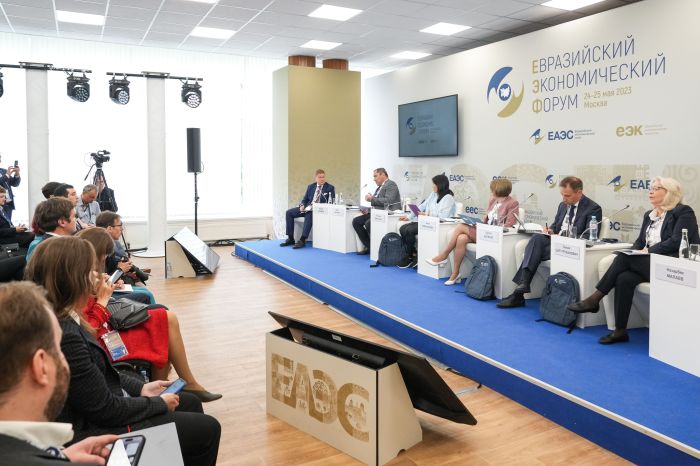KEY CONCLUSIONS
E-commerce market is developing faster than regulatory control
“Online commerce, or digital commerce, is developing much faster than we manage to regulate, make changes to legislation. <...> We are trying to find common ground so as not to infringe on consumer rights and help the business develop,” Nina Emelyanova, Deputy Minister of Antimonopoly Regulation and Trade of the Republic of Belarus.
“Comparing to what we planned two years ago, what development we expected, the volume of tasks has seriously increased for objective and subjective reasons. <...> Local tasks that launched the discussion of e-commerce at the Union level have transformed into strategic ones that have to be solved already at the Commission level for all the EAEU member states to ensure the unity of our market,” Vahagn Kazaryan, Director of the Department of Customs Tariff and Non-Tariff Regulation, Eurasian Economic Commission.
The development of e-commerce will benefit from the development of unified rules
“A massive digital transformation is currently taking place at the global level concerning electronic document management, transfer documents such as bills of lading, letters of credit and other documents related to transport and logistics. <...> It is very important to create a digital trade flow parallel to flows of physical goods,” Luca Castellani, Secretary of Working Group on Electronic Commerce, United Nations Commission on International Trade Law (UNCITRAL).
“We need to stop being afraid that one of the member states will somehow offend another, to stop trying to gain some conditions. It's obvious that unity is our strength as the Eurasian Union. <...> It is necessary to finally come to an agreement,” Tatyana Bakalchuk, General Director, Wildberries.
“We need the same rules. So that if a product is legal for turnover in Russia or Belarus, or in Kazakhstan, then it would be legal for turnover everywhere. Yes, there are certain categories of goods that are limited in turnover but, firstly, there are not that many of them, and secondly, the rules for them are clear,” Sergey Belyakov, Managing Director, Ozon.
PROBLEMS
The difference in regulation can lead to the imbalance
“The member states of our Union, separately cooperating with international platforms and organizations, develop their national legal framework. There are risks of imbalance and distortions. <...> Business today is already facing these problems, including indirect taxes, excessive requirements for business entities and a complex document flow. We need to settle everything,” Vahagn Kazaryan, Director of the Department of Customs Tariff and Non-Tariff Regulation, Eurasian Economic Commission.
“We, the giants of e-commerce, are arguing on the WTO platform [World Trade Organization – ed.], because the United States is only interested in regulating the issue of digital trade, digital services in the digital space, the EU is focused on simplifying trade in digital services and taxes, China – on simplifying Internet trade through digital platforms. So, in general, everyone has their own substantive interest on the WTO platform,” Liliya Shchur-Trukhanovich, Director of the Department for Development and Regulation of Foreign Economic Activity, Ministry of Economic Development of the Russian Federation.
Business community of the EAEU member states faces disadvantage from the absence of unified rules
“Tax conditions are the most important element of economic conditions. It is very strange to create economic conditions that discriminate against businesses from the EAEU member states in relation to companies from non-member states. <...> We have already created economic integration, an economic institution, an economic union, let's also create favourable conditions, even preferential ones, for companies from the EAEU member states in relation to third countries,” Sergey Belyakov, Managing Director, Ozon.
“There are situations now when it is easier to trade outside the Customs Union, because you pay less taxes, you have fewer problems with paperwork and there is definitely no list of prohibited for sale products,” Tatyana Bakalchuk, General Director, Wildberries.
SOLUTIONS
Harmonization of legislation and business requirements throughout the EAEU
“In our opinion, it is necessary to develop a horizontal norm, it is necessary to develop an agreement on electronic commerce that will set the main directions and create conditions that will ensure unified and fair development of electronic commerce with free movement of both physical and digital goods, and services” Vahagn Kazaryan, Director of the Department of Customs Tariff and Non-Tariff Regulation, Eurasian Economic Commission.
“We believe it is necessary to harmonize legislation related to consumer rights, to establish a list of commodity documents for crossing the borders inside the Customs Union, to create a list of goods prohibited to sale remotely and to resolve the issue of double taxation,” Tatyana Bakalchuk, General Director, Wildberries.
“There is an increase in the sale of goods through marketplaces that are located in the EAEU member states. <...> We tried to solve the issue of e-commerce administration by introducing amendments to the Tax Code. <...> We have two projects under discussion at the level of the Eurasian Economic Commission: collection of indirect taxes and an agreement on the e-commerce project. Either we will provide rules on certain requirements for electronic commerce in an agreement of the Union, or there will be a separate agreement within the Union,” Nazarbek Malaev, Deputy Minister of Economy and Commerce of the Kyrgyz Republic.
When developing unified rules and regulations, it is important to take into account the interests of business and consumers
“There are questions from both businesses and consumers. We want to bring everything together in a single document that will allow online commerce develop faster and will reduce obstacles. <...> There is no single list of goods prohibited for sale through online stores. We have already prepared a draft resolution of the Council of Ministers: the sale of pyrotechnic products, individual dietary supplements, and veterinary drugs is allowed because our business entities found themselves in unequal conditions with business entities of other countries,” Nina Emelyanova, Deputy Minister of Antimonopoly Regulation and Trade of the Republic of Belarus.
“We are ready to switch to the format of national systems that guarantees us financial sovereignty and reduces risks for our consumers so that consumers can easily pay,” Liliya Shchur-Trukhanovich, Director of the Department for Development and Regulation of Foreign Economic Activity, Ministry of Economic Development of the Russian Federation.

